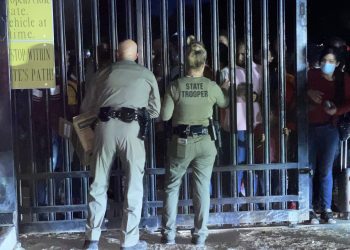DES MOINES, Iowa – On Wednesday evening, the Iowa Senate passed a bill, SF 2369, that codifies a parent/guardian bill of rights and establishes an education savings account program by a 31 to 18 mainly party-line vote.
State Senator Annette Sweeney, R-Alden, was the lone Republican to join Iowa Senate Democrats opposing the bill.
The parent/guardian bill of rights was an amendment to the bill (passed by a 32 to 17 vote), adding language from another bill to SF 2369.
Those rights include:
- The right to know what their student is being taught.
- The right to review and access information related to those who are teaching their student, including guest lecturers, and those contracting with or receiving money from the school district unless the release of that information is prohibited by state or federal law.
- The right to reasonable access to their student during the school day unless prohibited by state or federal law or a court order.
- The right to access and review their student’s school records unless state law prohibits a particular record from being disclosed.
- The right to access and review data and information on their student collected by the school
- The right to access and review information necessary to ensure the accountability and transparency of the board of directors of the school district or the governing board of the charter school
- The right to access and review information related to their student’s safety at school unless that information is deemed confidential by state or federal law
The bill also requires schools not to require students to engage in any activity, including instruction and tests, that involves obscene material without a parent or guardian’s written consent.
The legislation adds that schools “must make every effort” to ensure students can’t access sexually material in a classroom or on school-owned devices. It also states that schools shall not allow minor children to check out sexually explicit material from a library without prior written consent from parents.
The bill also creates “Student First Scholarships,” an education savings account program.
The “Student First Scholarships” would be implemented during the 2022-2023 school year. Scholarships would be worth 70 percent of the state’s per-pupil spending, currently $5,359, for qualified education expenses defined in the bill, such as non-public school tuition, textbooks, curriculum, tutoring, non-public online education, and vocational education.
A student must be enrolled in a public school for the 2021-22 school year and have a household income that does not exceed 400 percent of the federal poverty level or have an individualized educational plan to be eligible. The scholarships in the first year will be capped at 10,000.
The remaining 30 percent will be reallocated to school districts that participate in operational sharing among districts. This was from an amendment, the original language in the bill stated that the money would go to schools with a student enrollment of 500 or less. The change is meant to encourage the sharing of school functions such as administration, social workers, mental health, transportation, and other school support services. (Editor: This paragraph was edited, we originally reported on the original language in the bill, not realizing the change.)
Democrats spoke out in opposition to the bill.
“There’s nothing wrong with private education. I’ve attended mostly public schools in my life, but I have attended a private school. And we have nearly unlimited school choice in Iowa with open enrollment. And there’s even a role for homeschooling. But the idea that we would take away resources from public education to improve how we educate our students is out of touch. It would be like using taxpayer dollars to pave a road the public can’t drive on or a private pool that our kids can’t swim in. Why on earth would we give private schools our taxpayer dollars when they don’t have the commitment or the responsibility of educating all Iowa students?” Iowa Senate Minority Leader Zach Wahls, D-Coralville, argued.
“We should not create a private school entitlement program that wouldn’t ever inevitably grow and will never disappear. And we shouldn’t be doing it with public funds. Public dollars need to be used for public schools,” State Senator Jackie Smith, D-Sioux City, added.
Several Republicans spoke in support of the bill.
“We have three vibrant educational environments. We have a vibrant homeschool environment, a vibrant private school environment, and a vibrant public school environment. But we in the state are investing in just one of those environments; this needs come to an end,” State Senator Jesse Green, R-Boone, said.
“The problem is that competition, although it’s not appropriate in all areas of life, a lack of competition tends to lead to complacency. And we know that in most areas of life, we like diversity, right? We like competition, we like choices. But in the case of education, it’s much more of a one size fits all,” State Senator Jeff Taylor, R-Sioux Center, explained.
He added that the bill is a modest start, and if something disastrous happens, which he does not anticipate, course corrections can be made.
I find it hard to believe that it’s going to be doom and gloom, the sky is falling approach the Chicken Little approach. I just don’t find that believable, whether it comes from the Democratic Party or the Republican Party. We don’t live in a perfect world. This is the start of trying to improve educational opportunities for our children,” Taylor added.
State Senator Amy Sinclair, R-Allerton, the bill’s manager, gave passionate closing remarks.
“This is not an attack on teachers or schools,” she said. “This is not a bill designed to undermine public education. I and many of my colleagues on this side of the aisle have our own children in public schools. My child is a student at Wayne Community School District, and I love him being there. And I wouldn’t choose anything different for him. But here’s the deal I can choose. Because I have the means. It’s not about undermining the system that’s serving our very own children.”
Later Sinclair brought up several examples of where public dollars were used for private purposes.
“Why is this one public institution the sacred cow that can’t be breached? Why? If the public good the ultimate public purpose isn’t being served with our tax dollars, why on earth would we not find another way to accomplish the same goal as we have over and over and over again in the history of our great nation,” she asked.
After speaking for several minutes, Sinclair concluded, “There is no one size fits all when it comes to student success. Only parents should be the ones to have the opportunity to determine their child’s educational future. And they have the absolute right to decide that course as Americans.”
Gov. Kim Reynolds applauded the Senate’s passage of the bill.
“The Senate made clear tonight that parents matter. Iowans want and deserve school choice and educational freedom for their children and I urge the House to get this across the finish line and send a bill to my desk,” she said. “If education truly is the great equalizer, we should create opportunities for more families to provide their children with the education choice that’s best for them. That’s exactly what this legislation does.”
The companion legislation (before the amendment) has stalled in the Iowa House. The Iowa Torch reached out to State Rep. Dustin Hite, R-Oskaloosa, the chairman of the Iowa House Education Committee, but did not hear back.
State Rep. Skyler Wheeler, R-Orange City, the committee’s vice-chair, told The Iowa Torch the House Republican caucus continued to work on the issue.
“We are still working hard to get the House Republican Caucus to fund students, not systems. The issue is alive until the final gavel falls,” he said.
Speaker of the Iowa House Pat Grassley, R-New Hartford, said he remains hopeful.
“We’re continuing to work on the Governor’s ESA proposal in the House. I made the decision to move the bill to the Appropriations committee so it would be funnel proof and we could continue to the conversation with the entire caucus. I remain hopeful that we can do something to expand school choice for parents in Iowa,” he told The Iowa Torch.
















